Strategic Challenges for SASOL in the Global Business Environment
VerifiedAdded on 2021/01/01
|11
|2099
|244
Report
AI Summary
This report examines the global business environment with a focus on SASOL Limited, a South African company in the chemical and power industry. The report explores the factors driving globalization, including political, economic, social, technological, legal, and environmental (PESTLE) factors, and their impact on global business. It analyzes the strategic challenges SASOL faces, such as communication, language barriers, and technological adaptation, considering risk and diversification strategies, and supply chain flow. The analysis highlights both opportunities and challenges, such as cultural integration and operational difficulties. The conclusion emphasizes the importance of globalization, efficient policy design, and technological adoption for SASOL's success in the international market. The report uses various sources to support its findings, including references to different scholarly articles.
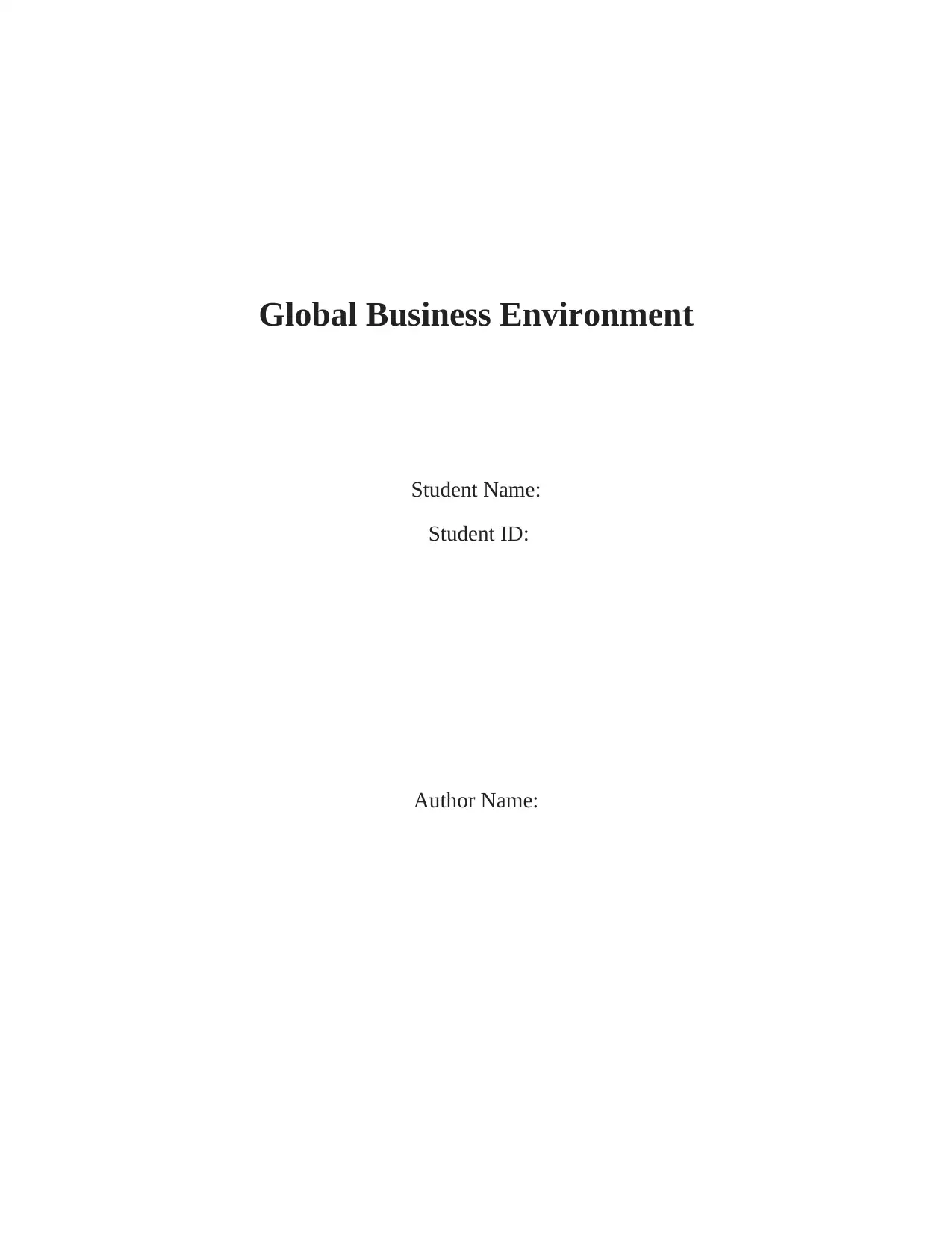
Global Business Environment
Student Name:
Student ID:
Author Name:
Student Name:
Student ID:
Author Name:
Paraphrase This Document
Need a fresh take? Get an instant paraphrase of this document with our AI Paraphraser
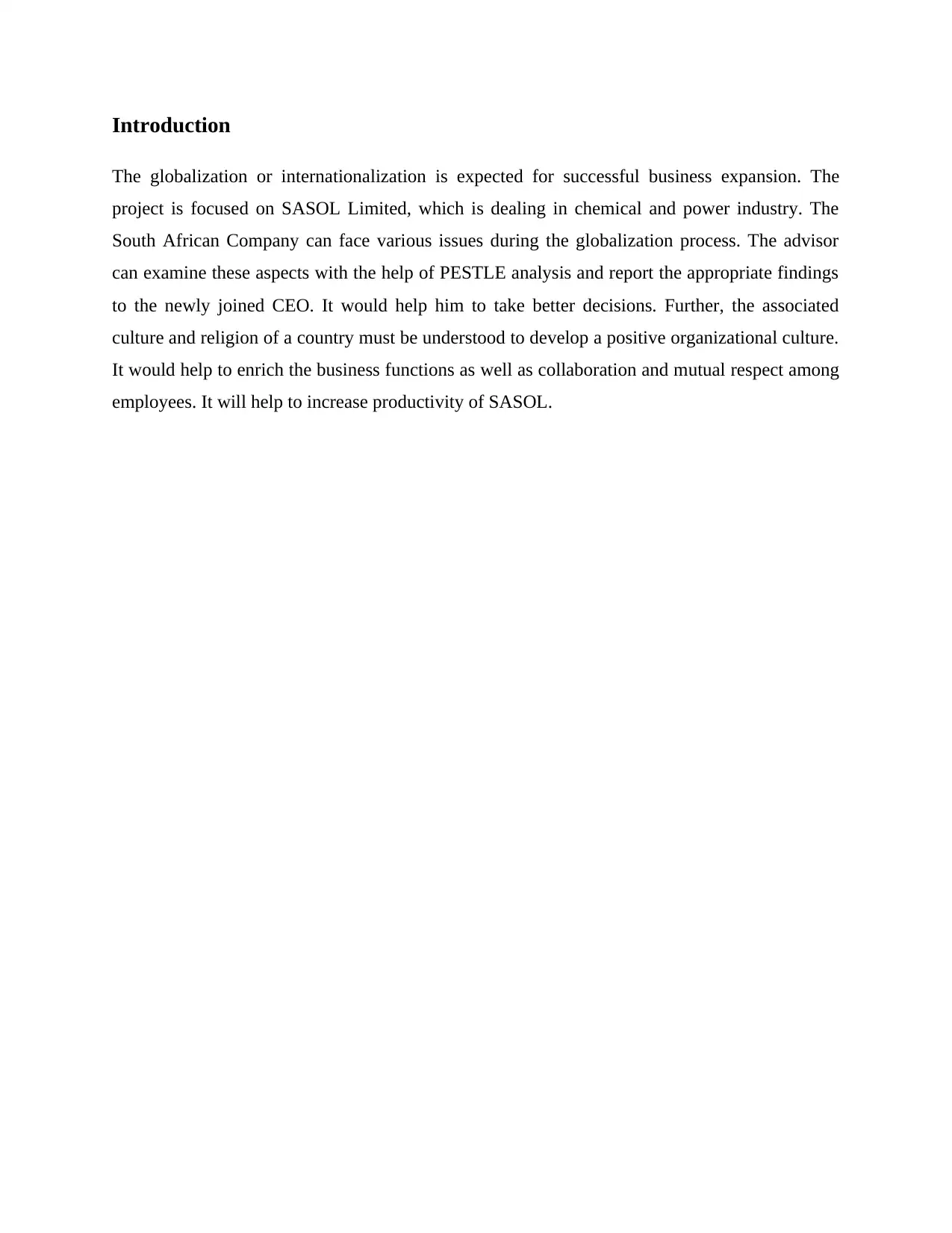
Introduction
The globalization or internationalization is expected for successful business expansion. The
project is focused on SASOL Limited, which is dealing in chemical and power industry. The
South African Company can face various issues during the globalization process. The advisor
can examine these aspects with the help of PESTLE analysis and report the appropriate findings
to the newly joined CEO. It would help him to take better decisions. Further, the associated
culture and religion of a country must be understood to develop a positive organizational culture.
It would help to enrich the business functions as well as collaboration and mutual respect among
employees. It will help to increase productivity of SASOL.
The globalization or internationalization is expected for successful business expansion. The
project is focused on SASOL Limited, which is dealing in chemical and power industry. The
South African Company can face various issues during the globalization process. The advisor
can examine these aspects with the help of PESTLE analysis and report the appropriate findings
to the newly joined CEO. It would help him to take better decisions. Further, the associated
culture and religion of a country must be understood to develop a positive organizational culture.
It would help to enrich the business functions as well as collaboration and mutual respect among
employees. It will help to increase productivity of SASOL.
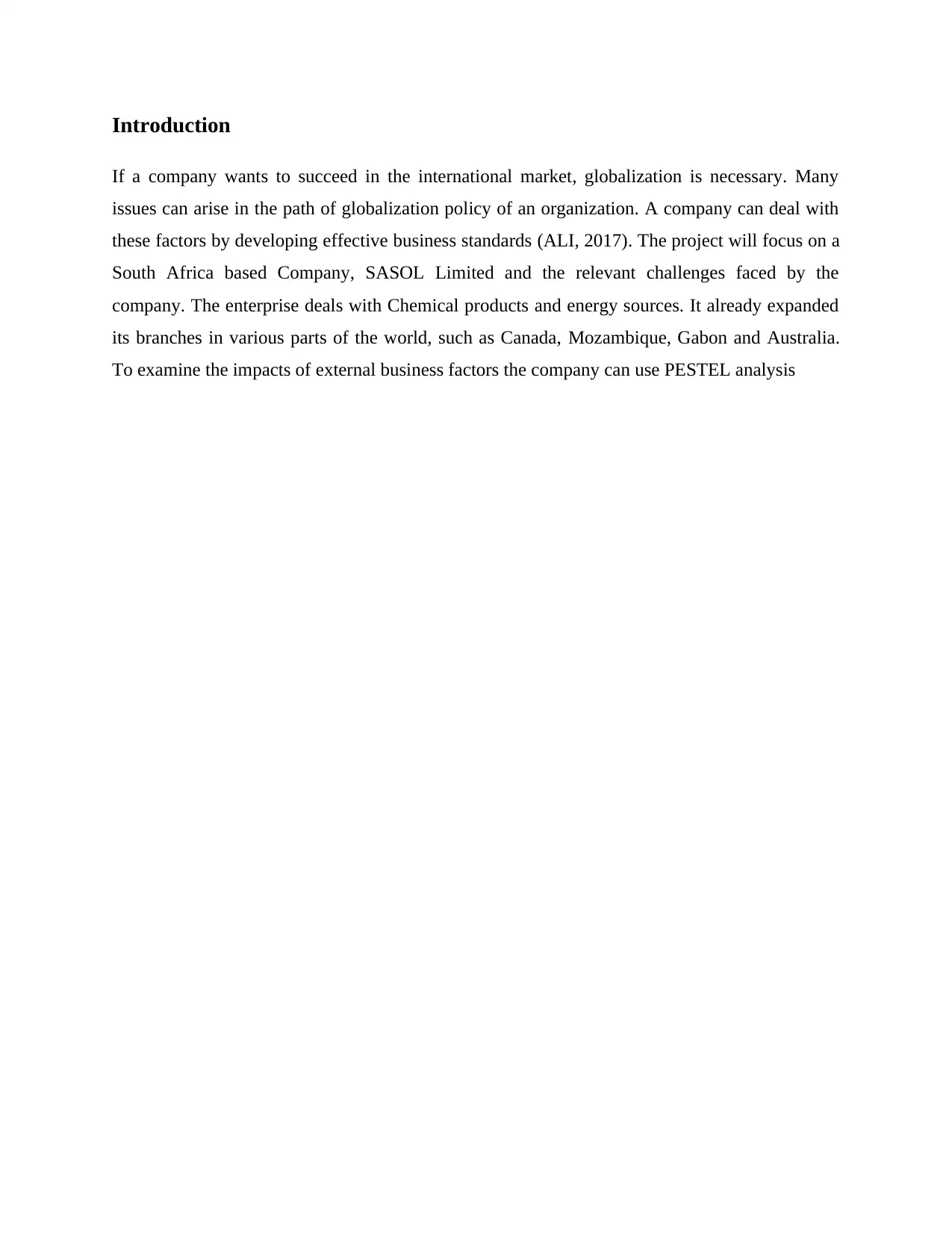
Introduction
If a company wants to succeed in the international market, globalization is necessary. Many
issues can arise in the path of globalization policy of an organization. A company can deal with
these factors by developing effective business standards (ALI, 2017). The project will focus on a
South Africa based Company, SASOL Limited and the relevant challenges faced by the
company. The enterprise deals with Chemical products and energy sources. It already expanded
its branches in various parts of the world, such as Canada, Mozambique, Gabon and Australia.
To examine the impacts of external business factors the company can use PESTEL analysis
If a company wants to succeed in the international market, globalization is necessary. Many
issues can arise in the path of globalization policy of an organization. A company can deal with
these factors by developing effective business standards (ALI, 2017). The project will focus on a
South Africa based Company, SASOL Limited and the relevant challenges faced by the
company. The enterprise deals with Chemical products and energy sources. It already expanded
its branches in various parts of the world, such as Canada, Mozambique, Gabon and Australia.
To examine the impacts of external business factors the company can use PESTEL analysis
⊘ This is a preview!⊘
Do you want full access?
Subscribe today to unlock all pages.

Trusted by 1+ million students worldwide
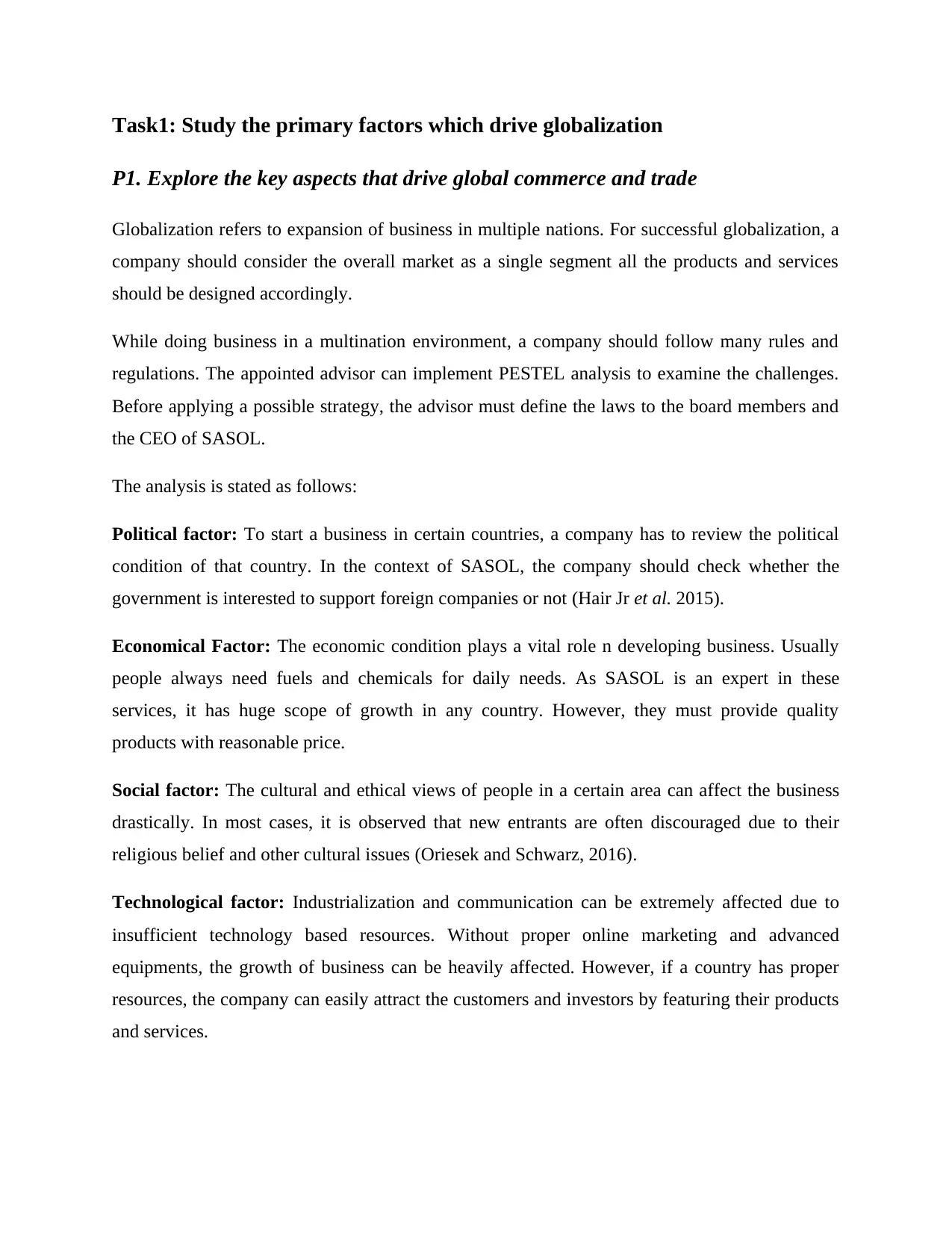
Task1: Study the primary factors which drive globalization
P1. Explore the key aspects that drive global commerce and trade
Globalization refers to expansion of business in multiple nations. For successful globalization, a
company should consider the overall market as a single segment all the products and services
should be designed accordingly.
While doing business in a multination environment, a company should follow many rules and
regulations. The appointed advisor can implement PESTEL analysis to examine the challenges.
Before applying a possible strategy, the advisor must define the laws to the board members and
the CEO of SASOL.
The analysis is stated as follows:
Political factor: To start a business in certain countries, a company has to review the political
condition of that country. In the context of SASOL, the company should check whether the
government is interested to support foreign companies or not (Hair Jr et al. 2015).
Economical Factor: The economic condition plays a vital role n developing business. Usually
people always need fuels and chemicals for daily needs. As SASOL is an expert in these
services, it has huge scope of growth in any country. However, they must provide quality
products with reasonable price.
Social factor: The cultural and ethical views of people in a certain area can affect the business
drastically. In most cases, it is observed that new entrants are often discouraged due to their
religious belief and other cultural issues (Oriesek and Schwarz, 2016).
Technological factor: Industrialization and communication can be extremely affected due to
insufficient technology based resources. Without proper online marketing and advanced
equipments, the growth of business can be heavily affected. However, if a country has proper
resources, the company can easily attract the customers and investors by featuring their products
and services.
P1. Explore the key aspects that drive global commerce and trade
Globalization refers to expansion of business in multiple nations. For successful globalization, a
company should consider the overall market as a single segment all the products and services
should be designed accordingly.
While doing business in a multination environment, a company should follow many rules and
regulations. The appointed advisor can implement PESTEL analysis to examine the challenges.
Before applying a possible strategy, the advisor must define the laws to the board members and
the CEO of SASOL.
The analysis is stated as follows:
Political factor: To start a business in certain countries, a company has to review the political
condition of that country. In the context of SASOL, the company should check whether the
government is interested to support foreign companies or not (Hair Jr et al. 2015).
Economical Factor: The economic condition plays a vital role n developing business. Usually
people always need fuels and chemicals for daily needs. As SASOL is an expert in these
services, it has huge scope of growth in any country. However, they must provide quality
products with reasonable price.
Social factor: The cultural and ethical views of people in a certain area can affect the business
drastically. In most cases, it is observed that new entrants are often discouraged due to their
religious belief and other cultural issues (Oriesek and Schwarz, 2016).
Technological factor: Industrialization and communication can be extremely affected due to
insufficient technology based resources. Without proper online marketing and advanced
equipments, the growth of business can be heavily affected. However, if a country has proper
resources, the company can easily attract the customers and investors by featuring their products
and services.
Paraphrase This Document
Need a fresh take? Get an instant paraphrase of this document with our AI Paraphraser
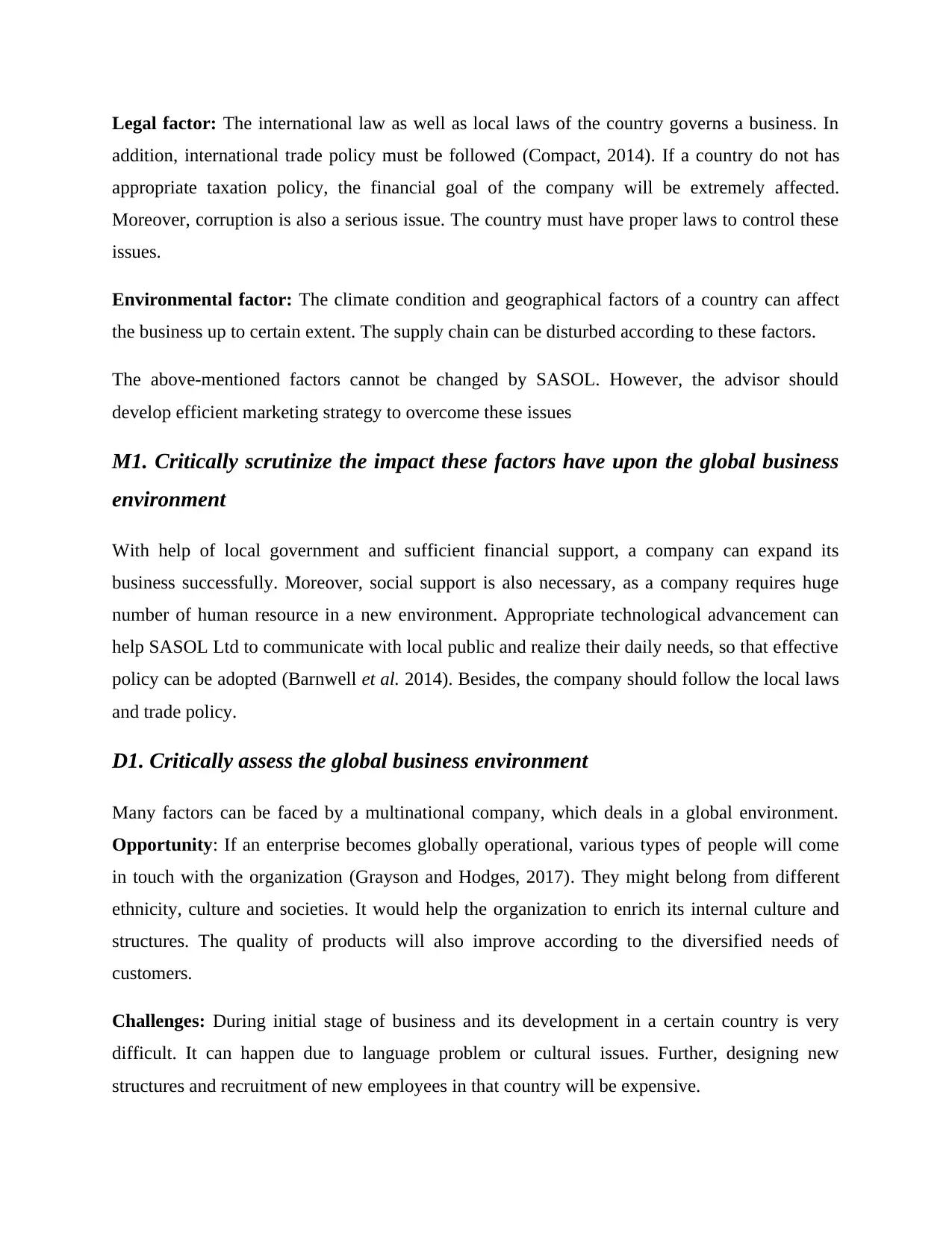
Legal factor: The international law as well as local laws of the country governs a business. In
addition, international trade policy must be followed (Compact, 2014). If a country do not has
appropriate taxation policy, the financial goal of the company will be extremely affected.
Moreover, corruption is also a serious issue. The country must have proper laws to control these
issues.
Environmental factor: The climate condition and geographical factors of a country can affect
the business up to certain extent. The supply chain can be disturbed according to these factors.
The above-mentioned factors cannot be changed by SASOL. However, the advisor should
develop efficient marketing strategy to overcome these issues
M1. Critically scrutinize the impact these factors have upon the global business
environment
With help of local government and sufficient financial support, a company can expand its
business successfully. Moreover, social support is also necessary, as a company requires huge
number of human resource in a new environment. Appropriate technological advancement can
help SASOL Ltd to communicate with local public and realize their daily needs, so that effective
policy can be adopted (Barnwell et al. 2014). Besides, the company should follow the local laws
and trade policy.
D1. Critically assess the global business environment
Many factors can be faced by a multinational company, which deals in a global environment.
Opportunity: If an enterprise becomes globally operational, various types of people will come
in touch with the organization (Grayson and Hodges, 2017). They might belong from different
ethnicity, culture and societies. It would help the organization to enrich its internal culture and
structures. The quality of products will also improve according to the diversified needs of
customers.
Challenges: During initial stage of business and its development in a certain country is very
difficult. It can happen due to language problem or cultural issues. Further, designing new
structures and recruitment of new employees in that country will be expensive.
addition, international trade policy must be followed (Compact, 2014). If a country do not has
appropriate taxation policy, the financial goal of the company will be extremely affected.
Moreover, corruption is also a serious issue. The country must have proper laws to control these
issues.
Environmental factor: The climate condition and geographical factors of a country can affect
the business up to certain extent. The supply chain can be disturbed according to these factors.
The above-mentioned factors cannot be changed by SASOL. However, the advisor should
develop efficient marketing strategy to overcome these issues
M1. Critically scrutinize the impact these factors have upon the global business
environment
With help of local government and sufficient financial support, a company can expand its
business successfully. Moreover, social support is also necessary, as a company requires huge
number of human resource in a new environment. Appropriate technological advancement can
help SASOL Ltd to communicate with local public and realize their daily needs, so that effective
policy can be adopted (Barnwell et al. 2014). Besides, the company should follow the local laws
and trade policy.
D1. Critically assess the global business environment
Many factors can be faced by a multinational company, which deals in a global environment.
Opportunity: If an enterprise becomes globally operational, various types of people will come
in touch with the organization (Grayson and Hodges, 2017). They might belong from different
ethnicity, culture and societies. It would help the organization to enrich its internal culture and
structures. The quality of products will also improve according to the diversified needs of
customers.
Challenges: During initial stage of business and its development in a certain country is very
difficult. It can happen due to language problem or cultural issues. Further, designing new
structures and recruitment of new employees in that country will be expensive.
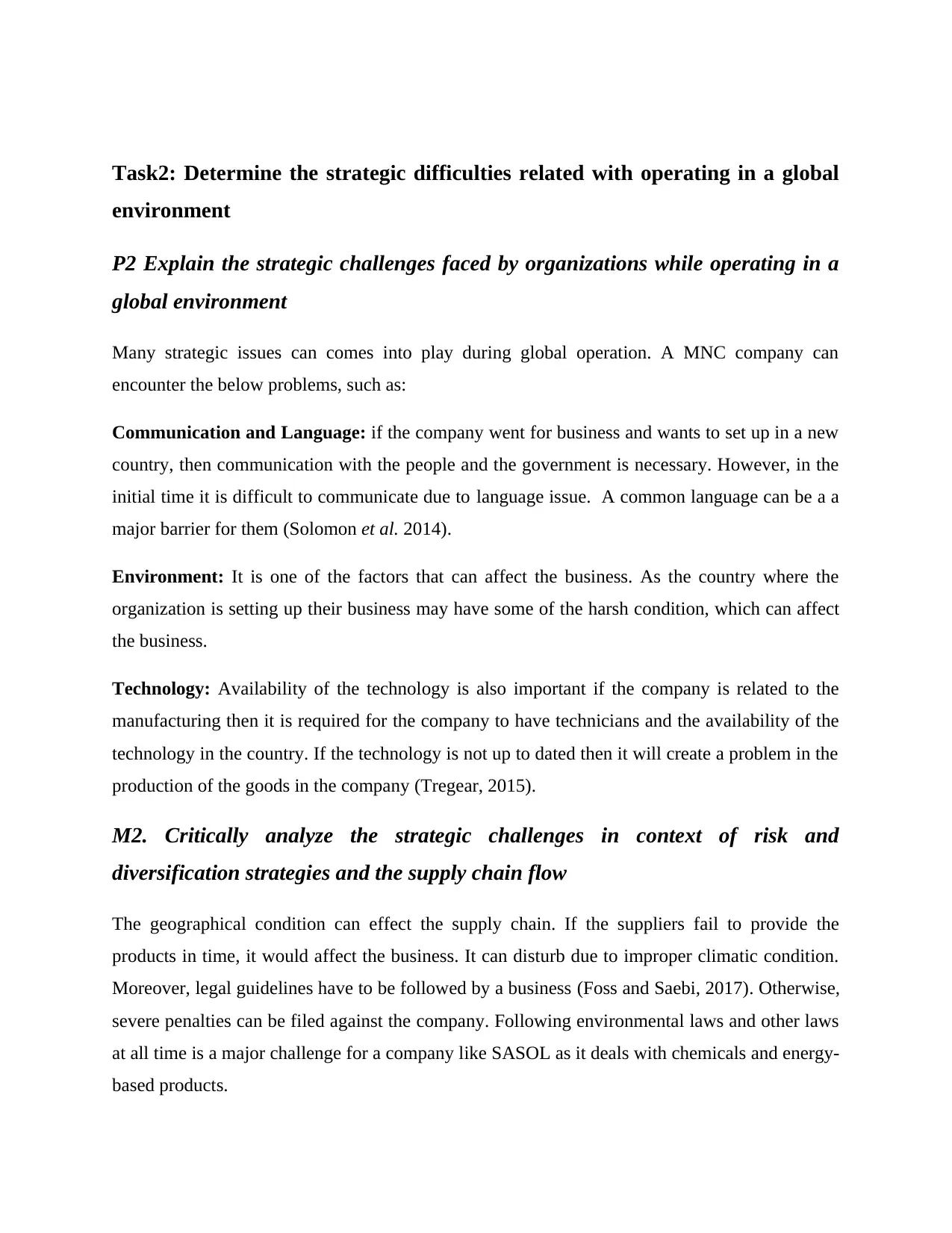
Task2: Determine the strategic difficulties related with operating in a global
environment
P2 Explain the strategic challenges faced by organizations while operating in a
global environment
Many strategic issues can comes into play during global operation. A MNC company can
encounter the below problems, such as:
Communication and Language: if the company went for business and wants to set up in a new
country, then communication with the people and the government is necessary. However, in the
initial time it is difficult to communicate due to language issue. A common language can be a a
major barrier for them (Solomon et al. 2014).
Environment: It is one of the factors that can affect the business. As the country where the
organization is setting up their business may have some of the harsh condition, which can affect
the business.
Technology: Availability of the technology is also important if the company is related to the
manufacturing then it is required for the company to have technicians and the availability of the
technology in the country. If the technology is not up to dated then it will create a problem in the
production of the goods in the company (Tregear, 2015).
M2. Critically analyze the strategic challenges in context of risk and
diversification strategies and the supply chain flow
The geographical condition can effect the supply chain. If the suppliers fail to provide the
products in time, it would affect the business. It can disturb due to improper climatic condition.
Moreover, legal guidelines have to be followed by a business (Foss and Saebi, 2017). Otherwise,
severe penalties can be filed against the company. Following environmental laws and other laws
at all time is a major challenge for a company like SASOL as it deals with chemicals and energy-
based products.
environment
P2 Explain the strategic challenges faced by organizations while operating in a
global environment
Many strategic issues can comes into play during global operation. A MNC company can
encounter the below problems, such as:
Communication and Language: if the company went for business and wants to set up in a new
country, then communication with the people and the government is necessary. However, in the
initial time it is difficult to communicate due to language issue. A common language can be a a
major barrier for them (Solomon et al. 2014).
Environment: It is one of the factors that can affect the business. As the country where the
organization is setting up their business may have some of the harsh condition, which can affect
the business.
Technology: Availability of the technology is also important if the company is related to the
manufacturing then it is required for the company to have technicians and the availability of the
technology in the country. If the technology is not up to dated then it will create a problem in the
production of the goods in the company (Tregear, 2015).
M2. Critically analyze the strategic challenges in context of risk and
diversification strategies and the supply chain flow
The geographical condition can effect the supply chain. If the suppliers fail to provide the
products in time, it would affect the business. It can disturb due to improper climatic condition.
Moreover, legal guidelines have to be followed by a business (Foss and Saebi, 2017). Otherwise,
severe penalties can be filed against the company. Following environmental laws and other laws
at all time is a major challenge for a company like SASOL as it deals with chemicals and energy-
based products.
⊘ This is a preview!⊘
Do you want full access?
Subscribe today to unlock all pages.

Trusted by 1+ million students worldwide
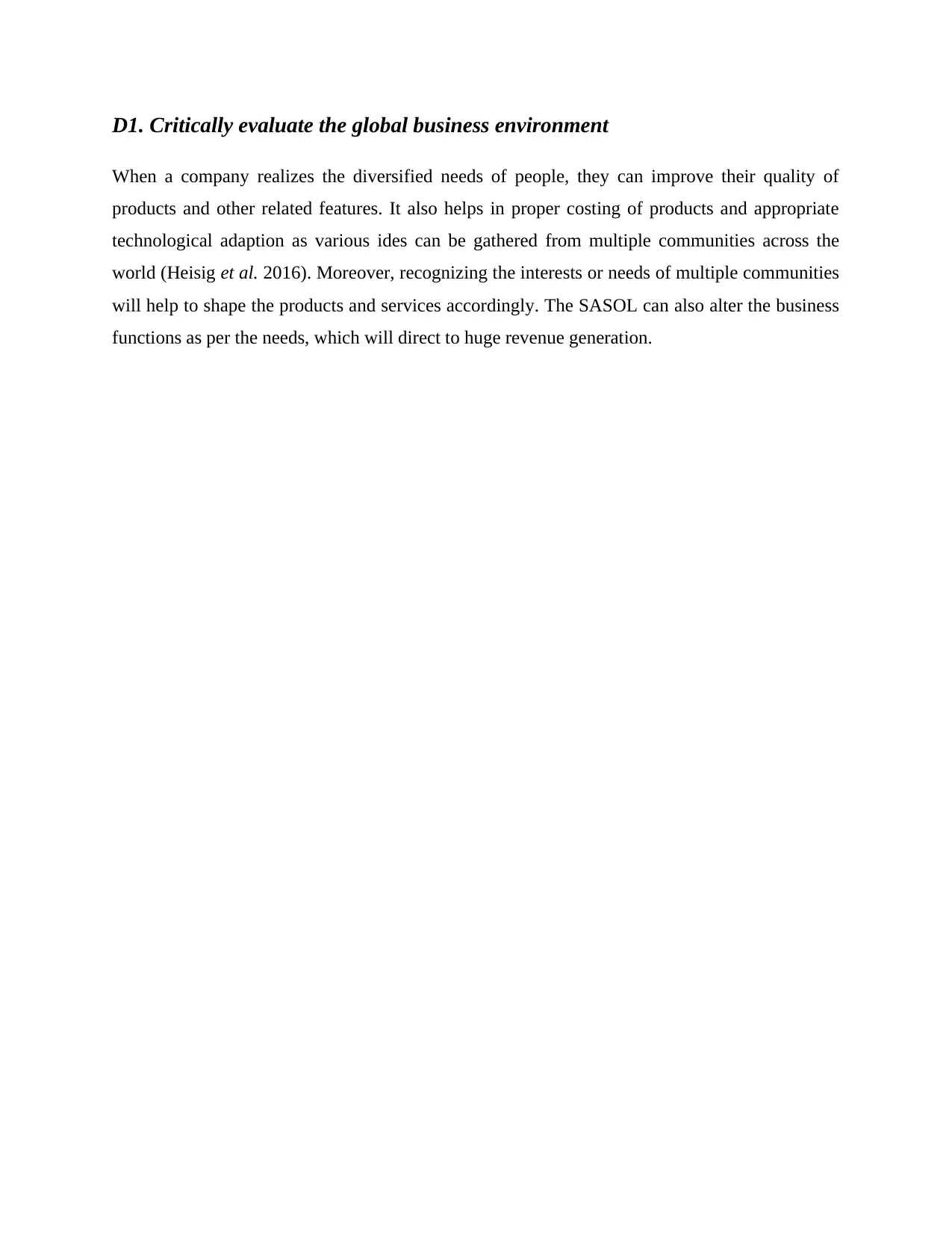
D1. Critically evaluate the global business environment
When a company realizes the diversified needs of people, they can improve their quality of
products and other related features. It also helps in proper costing of products and appropriate
technological adaption as various ides can be gathered from multiple communities across the
world (Heisig et al. 2016). Moreover, recognizing the interests or needs of multiple communities
will help to shape the products and services accordingly. The SASOL can also alter the business
functions as per the needs, which will direct to huge revenue generation.
When a company realizes the diversified needs of people, they can improve their quality of
products and other related features. It also helps in proper costing of products and appropriate
technological adaption as various ides can be gathered from multiple communities across the
world (Heisig et al. 2016). Moreover, recognizing the interests or needs of multiple communities
will help to shape the products and services accordingly. The SASOL can also alter the business
functions as per the needs, which will direct to huge revenue generation.
Paraphrase This Document
Need a fresh take? Get an instant paraphrase of this document with our AI Paraphraser
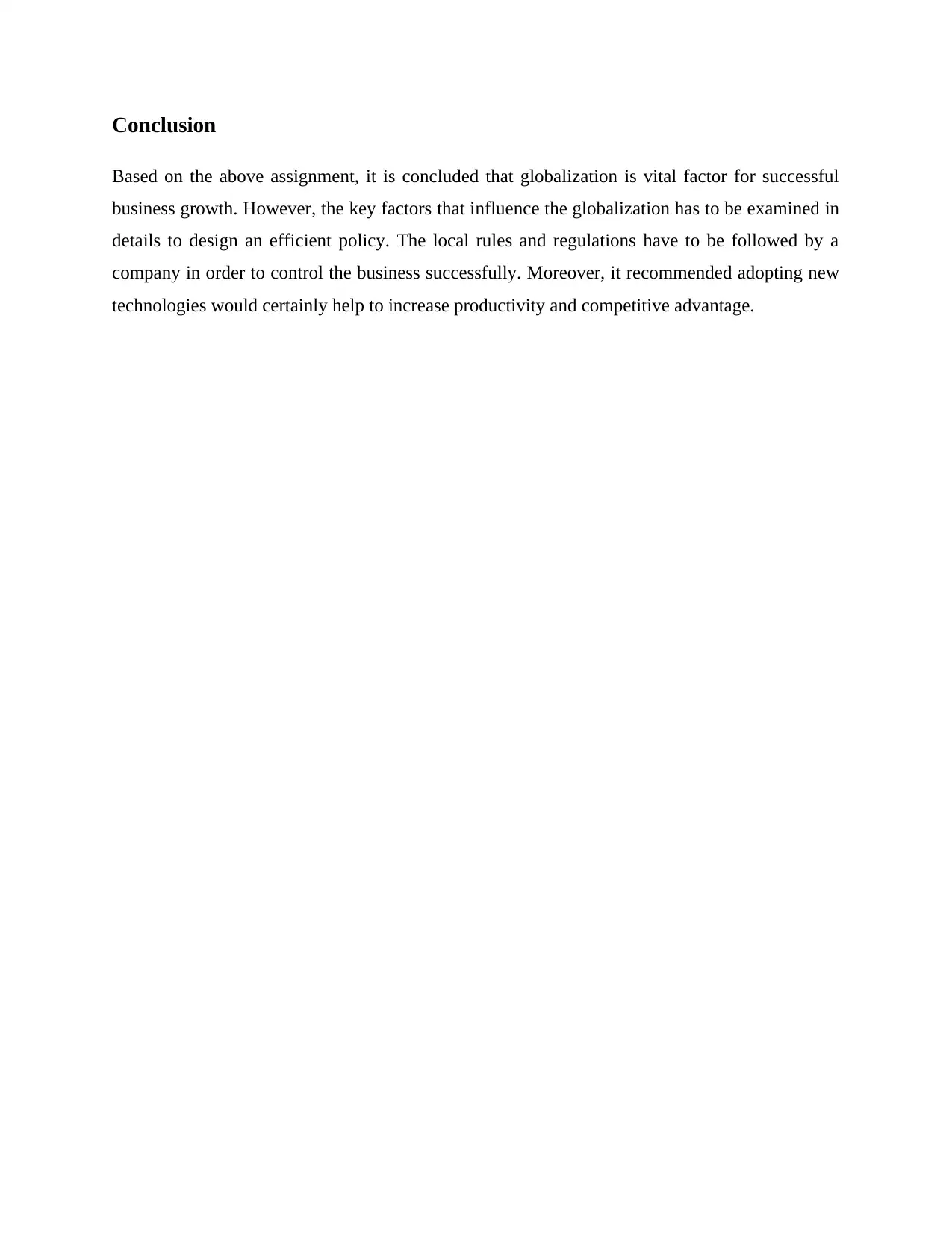
Conclusion
Based on the above assignment, it is concluded that globalization is vital factor for successful
business growth. However, the key factors that influence the globalization has to be examined in
details to design an efficient policy. The local rules and regulations have to be followed by a
company in order to control the business successfully. Moreover, it recommended adopting new
technologies would certainly help to increase productivity and competitive advantage.
Based on the above assignment, it is concluded that globalization is vital factor for successful
business growth. However, the key factors that influence the globalization has to be examined in
details to design an efficient policy. The local rules and regulations have to be followed by a
company in order to control the business successfully. Moreover, it recommended adopting new
technologies would certainly help to increase productivity and competitive advantage.
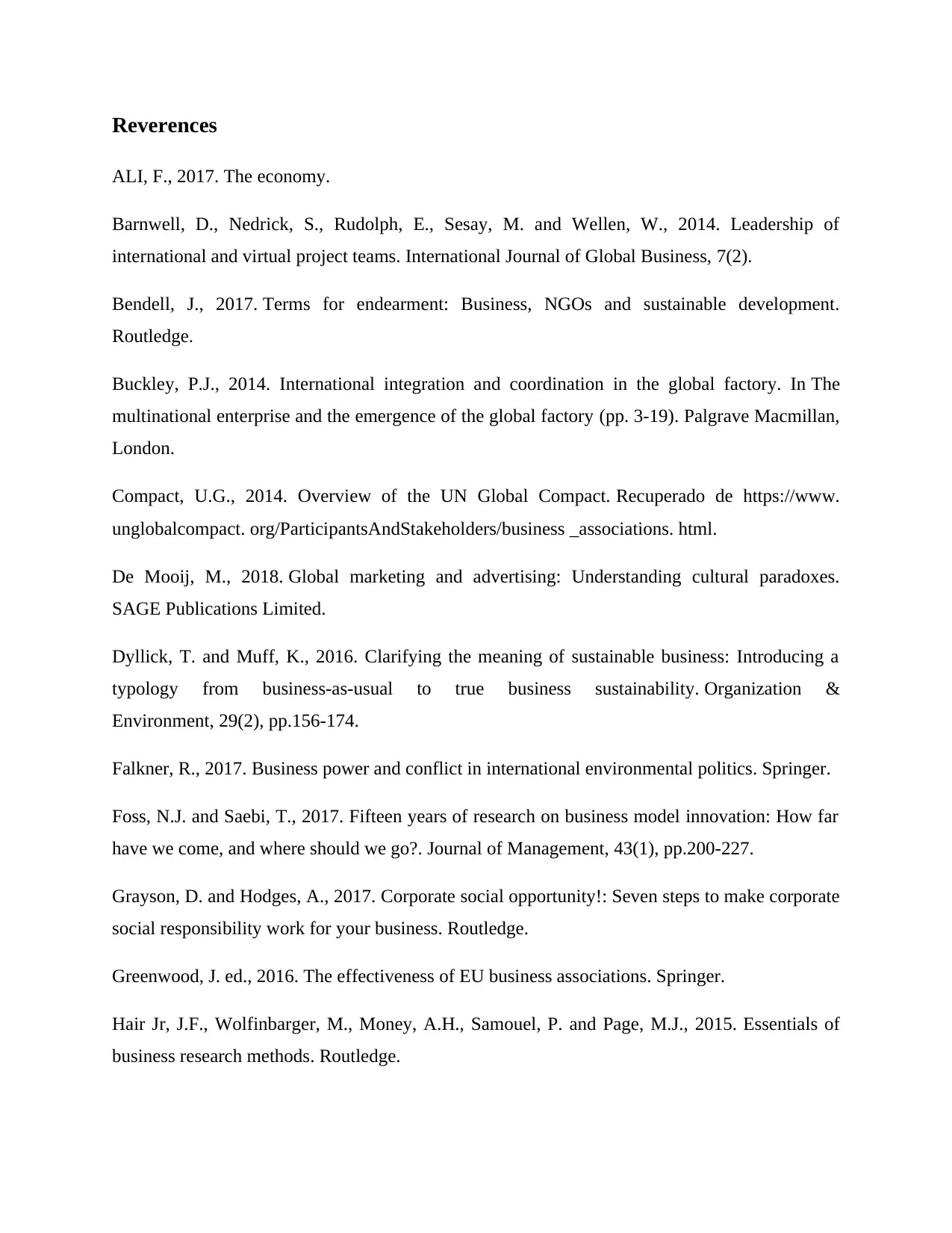
Reverences
ALI, F., 2017. The economy.
Barnwell, D., Nedrick, S., Rudolph, E., Sesay, M. and Wellen, W., 2014. Leadership of
international and virtual project teams. International Journal of Global Business, 7(2).
Bendell, J., 2017. Terms for endearment: Business, NGOs and sustainable development.
Routledge.
Buckley, P.J., 2014. International integration and coordination in the global factory. In The
multinational enterprise and the emergence of the global factory (pp. 3-19). Palgrave Macmillan,
London.
Compact, U.G., 2014. Overview of the UN Global Compact. Recuperado de https://www.
unglobalcompact. org/ParticipantsAndStakeholders/business _associations. html.
De Mooij, M., 2018. Global marketing and advertising: Understanding cultural paradoxes.
SAGE Publications Limited.
Dyllick, T. and Muff, K., 2016. Clarifying the meaning of sustainable business: Introducing a
typology from business-as-usual to true business sustainability. Organization &
Environment, 29(2), pp.156-174.
Falkner, R., 2017. Business power and conflict in international environmental politics. Springer.
Foss, N.J. and Saebi, T., 2017. Fifteen years of research on business model innovation: How far
have we come, and where should we go?. Journal of Management, 43(1), pp.200-227.
Grayson, D. and Hodges, A., 2017. Corporate social opportunity!: Seven steps to make corporate
social responsibility work for your business. Routledge.
Greenwood, J. ed., 2016. The effectiveness of EU business associations. Springer.
Hair Jr, J.F., Wolfinbarger, M., Money, A.H., Samouel, P. and Page, M.J., 2015. Essentials of
business research methods. Routledge.
ALI, F., 2017. The economy.
Barnwell, D., Nedrick, S., Rudolph, E., Sesay, M. and Wellen, W., 2014. Leadership of
international and virtual project teams. International Journal of Global Business, 7(2).
Bendell, J., 2017. Terms for endearment: Business, NGOs and sustainable development.
Routledge.
Buckley, P.J., 2014. International integration and coordination in the global factory. In The
multinational enterprise and the emergence of the global factory (pp. 3-19). Palgrave Macmillan,
London.
Compact, U.G., 2014. Overview of the UN Global Compact. Recuperado de https://www.
unglobalcompact. org/ParticipantsAndStakeholders/business _associations. html.
De Mooij, M., 2018. Global marketing and advertising: Understanding cultural paradoxes.
SAGE Publications Limited.
Dyllick, T. and Muff, K., 2016. Clarifying the meaning of sustainable business: Introducing a
typology from business-as-usual to true business sustainability. Organization &
Environment, 29(2), pp.156-174.
Falkner, R., 2017. Business power and conflict in international environmental politics. Springer.
Foss, N.J. and Saebi, T., 2017. Fifteen years of research on business model innovation: How far
have we come, and where should we go?. Journal of Management, 43(1), pp.200-227.
Grayson, D. and Hodges, A., 2017. Corporate social opportunity!: Seven steps to make corporate
social responsibility work for your business. Routledge.
Greenwood, J. ed., 2016. The effectiveness of EU business associations. Springer.
Hair Jr, J.F., Wolfinbarger, M., Money, A.H., Samouel, P. and Page, M.J., 2015. Essentials of
business research methods. Routledge.
⊘ This is a preview!⊘
Do you want full access?
Subscribe today to unlock all pages.

Trusted by 1+ million students worldwide
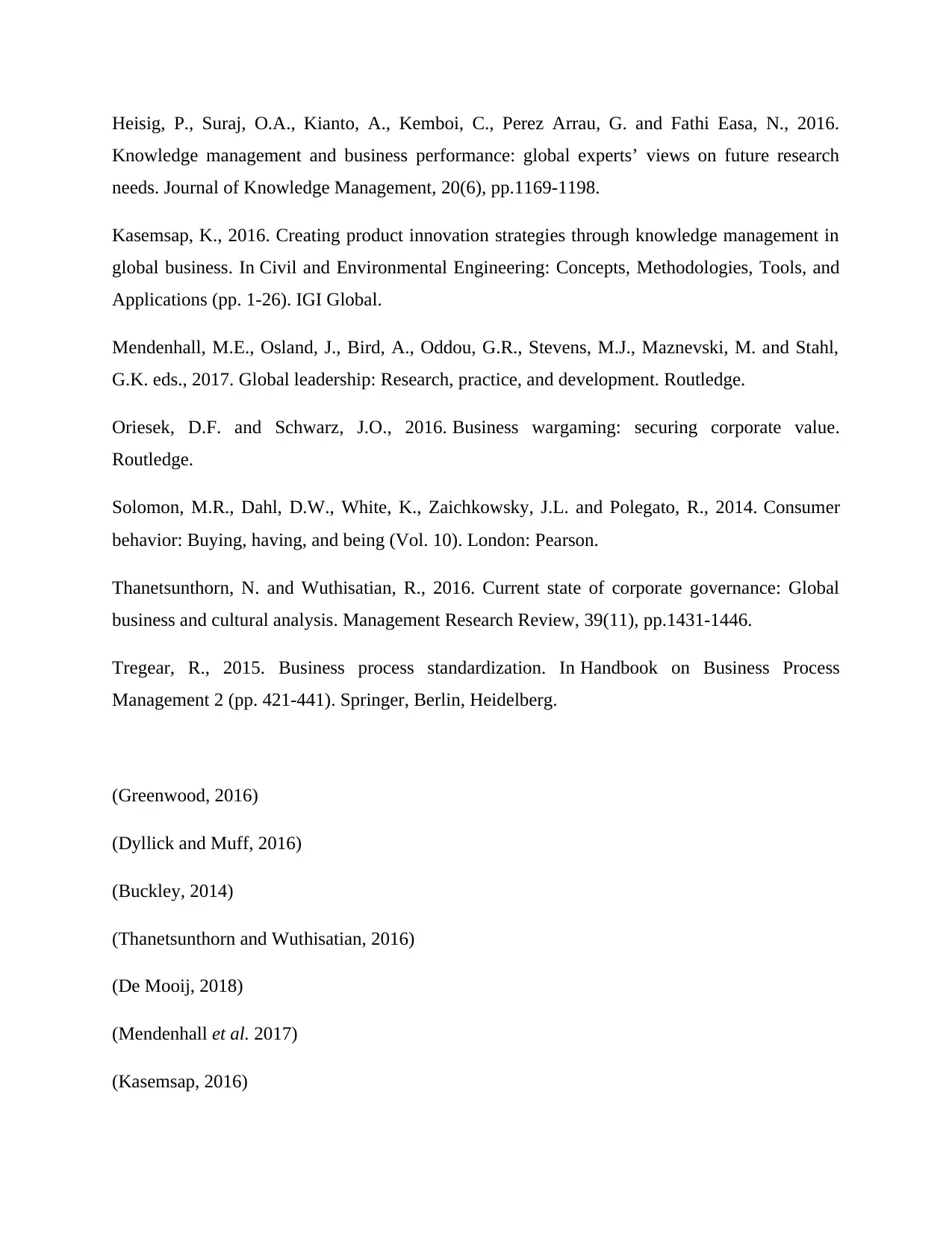
Heisig, P., Suraj, O.A., Kianto, A., Kemboi, C., Perez Arrau, G. and Fathi Easa, N., 2016.
Knowledge management and business performance: global experts’ views on future research
needs. Journal of Knowledge Management, 20(6), pp.1169-1198.
Kasemsap, K., 2016. Creating product innovation strategies through knowledge management in
global business. In Civil and Environmental Engineering: Concepts, Methodologies, Tools, and
Applications (pp. 1-26). IGI Global.
Mendenhall, M.E., Osland, J., Bird, A., Oddou, G.R., Stevens, M.J., Maznevski, M. and Stahl,
G.K. eds., 2017. Global leadership: Research, practice, and development. Routledge.
Oriesek, D.F. and Schwarz, J.O., 2016. Business wargaming: securing corporate value.
Routledge.
Solomon, M.R., Dahl, D.W., White, K., Zaichkowsky, J.L. and Polegato, R., 2014. Consumer
behavior: Buying, having, and being (Vol. 10). London: Pearson.
Thanetsunthorn, N. and Wuthisatian, R., 2016. Current state of corporate governance: Global
business and cultural analysis. Management Research Review, 39(11), pp.1431-1446.
Tregear, R., 2015. Business process standardization. In Handbook on Business Process
Management 2 (pp. 421-441). Springer, Berlin, Heidelberg.
(Greenwood, 2016)
(Dyllick and Muff, 2016)
(Buckley, 2014)
(Thanetsunthorn and Wuthisatian, 2016)
(De Mooij, 2018)
(Mendenhall et al. 2017)
(Kasemsap, 2016)
Knowledge management and business performance: global experts’ views on future research
needs. Journal of Knowledge Management, 20(6), pp.1169-1198.
Kasemsap, K., 2016. Creating product innovation strategies through knowledge management in
global business. In Civil and Environmental Engineering: Concepts, Methodologies, Tools, and
Applications (pp. 1-26). IGI Global.
Mendenhall, M.E., Osland, J., Bird, A., Oddou, G.R., Stevens, M.J., Maznevski, M. and Stahl,
G.K. eds., 2017. Global leadership: Research, practice, and development. Routledge.
Oriesek, D.F. and Schwarz, J.O., 2016. Business wargaming: securing corporate value.
Routledge.
Solomon, M.R., Dahl, D.W., White, K., Zaichkowsky, J.L. and Polegato, R., 2014. Consumer
behavior: Buying, having, and being (Vol. 10). London: Pearson.
Thanetsunthorn, N. and Wuthisatian, R., 2016. Current state of corporate governance: Global
business and cultural analysis. Management Research Review, 39(11), pp.1431-1446.
Tregear, R., 2015. Business process standardization. In Handbook on Business Process
Management 2 (pp. 421-441). Springer, Berlin, Heidelberg.
(Greenwood, 2016)
(Dyllick and Muff, 2016)
(Buckley, 2014)
(Thanetsunthorn and Wuthisatian, 2016)
(De Mooij, 2018)
(Mendenhall et al. 2017)
(Kasemsap, 2016)
Paraphrase This Document
Need a fresh take? Get an instant paraphrase of this document with our AI Paraphraser

(Bendell, 2017)
(Falkner, 2017)
(Falkner, 2017)
1 out of 11
Related Documents
Your All-in-One AI-Powered Toolkit for Academic Success.
+13062052269
info@desklib.com
Available 24*7 on WhatsApp / Email
![[object Object]](/_next/static/media/star-bottom.7253800d.svg)
Unlock your academic potential
Copyright © 2020–2026 A2Z Services. All Rights Reserved. Developed and managed by ZUCOL.





